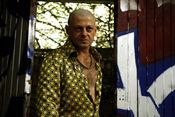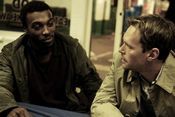
Andy Serkis as Hoodwink in the film... looking "great in a silk shirt"
Jennie Kermode: What initially attracted you to this story?
Gary Love: I'm very interested in the theme that men or women can have many deep and dark sides to their daily personalities and I thought this film (all in real time) had it in spades. I also thought that it could be made for the budget. Having a guaranteed green light also helped!
JK: When they hear about Sugarhouse, viewers will be expecting another film in the recent popular tradition of British crime thrillers, but this film has a distinctly different tone. To what extent is that due to its origins as a stage play and to what extent did you make a deliberate decision to try to add a more character-based element to the genre?
GL: The stage play characters always had a very strong grounding, but they needed the quality of actors we managed to attract to give them the heart and soul they required, that in turn then (hopefully) makes them feel integral to the story. Great actors - and we have them here - being allowed to flourish, will always bring out the core of their characters.
JK: The characters of Tom [played by Steven Mackintosh] and D [played by Ashley Walters] turn out to have more in common than they initially realise, though they're from very different worlds. Which of those worlds do you expect to draw your audience from?
 |
JK: How did you go about casting the pivotal role of Hoodwink? Were you looking for any particular characteristics to make him stand out as a villain?
GL: He was heavily based on someone I know, someone who is smart, bright and at certain times ferocious. I find that a dizzying combination and very filmic. We looked at a number of people for the role but when we discovered Andy [Serkis] was available and interested, we, obviously, jumped at the chance of having him. And he looks great in tight white trousers and yellow silk shirts!
JK: This film presents a view of London very different from the one we're used to seeing in cinemas. Was the setting particularly important to you in telling us about these characters?
GL: I loved the estate we used. Its bold, aggressive façade was perfect for the cocoon I wanted Hoods and D to exist in. I grew up on council estates like this one as a child, some of them high rise, and when you played outside you always had to look up regularly as TVs and washing machines and the odd egg would regularly get thrown out of windows on us below. D used to live in one of these flats in better times, whilst Hoods is working very hard and with great risk to get out of his.
JK: Fatherhood is an important theme in this film. Was it important to you to give us this extra bit of insight into your characters' backgrounds?
GL: I honestly feel we tell too much of their backgrounds but it was very important for me to show how men have needs no matter who they are or where they're from. Tom wants to be a good dad and would've worked hard at it, had he had the chance. In fact what would D's life have been like if he had had a father like Tom, a man who really loved him, encouraged him and didn't beat his mother? And then there's Hoods who is so desperate to be a father, he'll do anything to keep that road clear.
JK: What do you hope audiences will get out of the film?
GL: A good laugh. A good cry. Then maybe they'll think about the life of the person they see in the street and wonder how they got there, 'because there but for the grace of God go I'.
JK: Any other projects in the pipeline?
GL: I'm in the process of adapting a book. A true story. Ready to be read - and hopefully prepped - in late December. I'm currently looking for finance.
Sugarhouse will be showing at this year's Edinburgh International Film Festival and goes on general release from August 24.





















